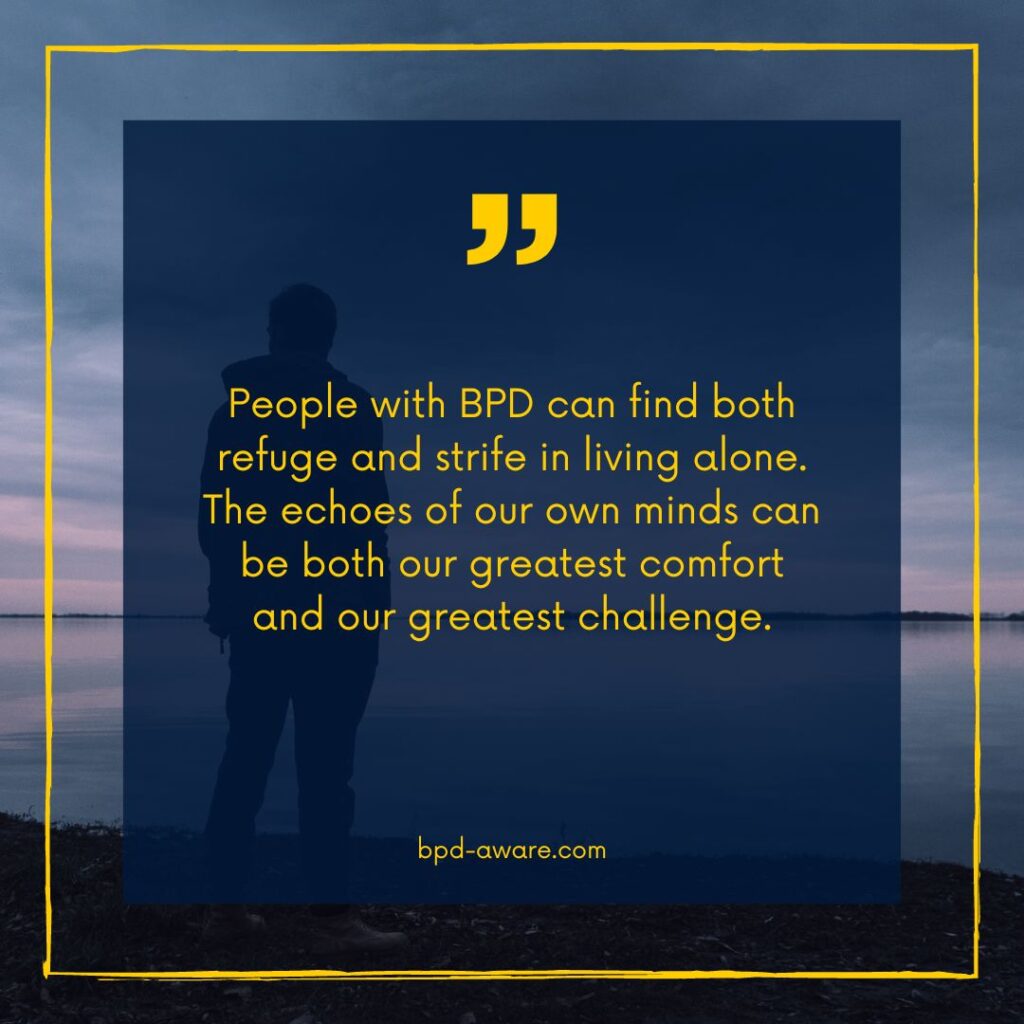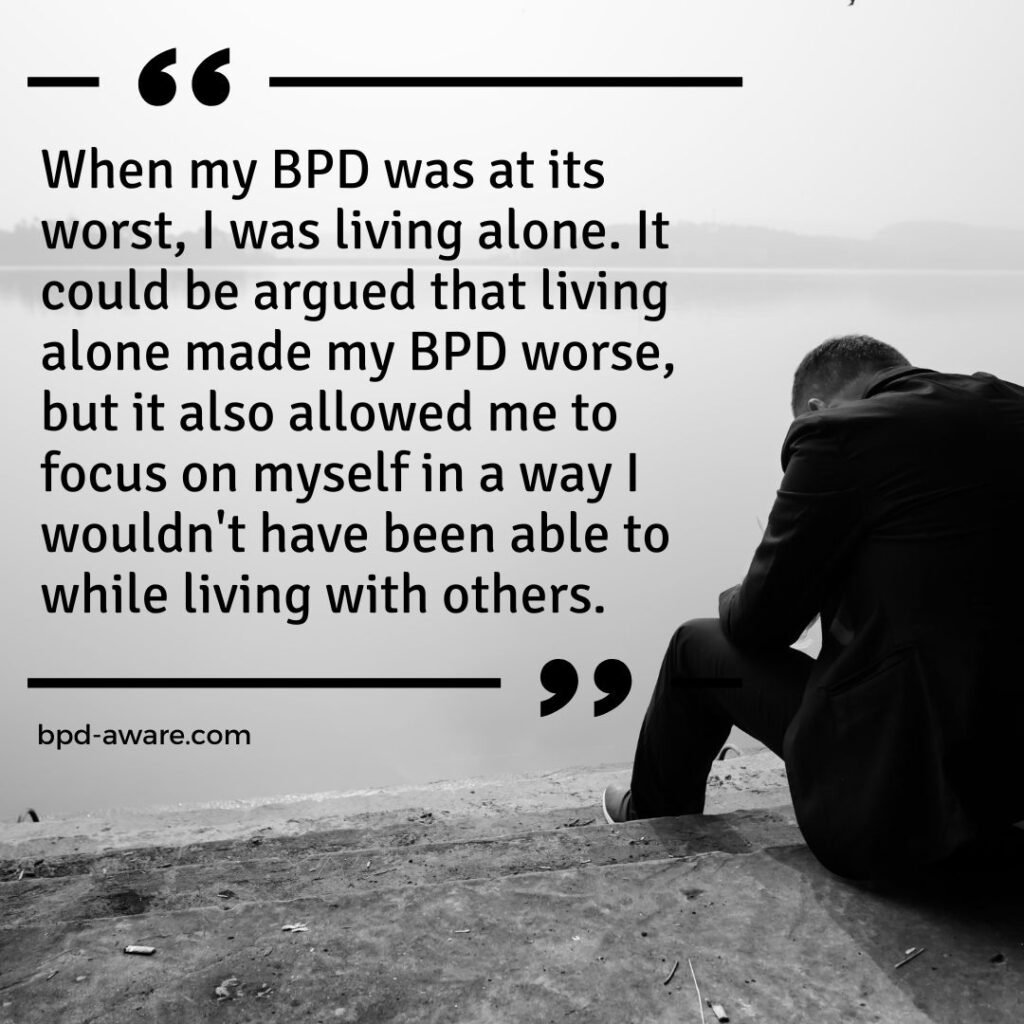Living alone is often considered to be a milestone of independence and adulthood. While this may be the case for some people, when you have mental health issues like Borderline Personality Disorder (BPD), things become more complicated.
BPD is a complex mental health disorder and can present itself in many ways. Everyone with BPD is going to have different experiences. There are many challenges to living with BPD, which can lead one to wonder if someone with BPD can live on their own, or whether they’d be better off with more immediate support around them.
In this article we will delve into the question: Can someone with BPD live alone?
We will explore the challenges of living alone with BPD, as well as living with other people. We will also discuss how the severities, subtypes, and symptoms experienced by the individual can have a major effect on whether or not they should live alone. Finally, we will provide some tips for independent living for those of you with BPD who need a little advice.
The Challenges of Living With BPD
Living with BPD is incredibly difficult. Every day feels like a struggle. Moods can swing up and down violently, as can opinions on other people, leading to many fights. The fear of abandonment can make someone feel more lonely and cut off. This makes it hard to make friends and form meaningful relationships. Acting on impulse, a common BPD symptom, can lead to money issues, legal problems, and dangerous situations.
Keeping a job or staying in school is also difficult, because focusing can be tough, motivation drops, and dealing with people gets tricky. Feeling empty and unsure of one’s identity makes it hard to set goals and work toward a bright future. For more on this, read our article: Surprising Ways BPD Affects Everyday Life
Choosing to live alone or with others is a very personal choice, one that should make you carefully consider your situation. How severe your BPD is, what subtype of BPD you have, and how your symptoms impact you all need to be considered. Some people with BPD do well on their own, but others may find that living with supportive friends or family is better for them and makes their lives better. Understanding the relationship between the severity of BPD and the subtype of BPD you have can help you make decisions that create stability, security, and a better quality of life.

Severity of BPD Symptoms
BPD symptoms can range from mild to severe. The severity is often marked by the impact the symptoms have on your day-to-day life. Things like how often you suffer mood swings and how extreme they are are good markers of the severity of your BPD.
People with mild-to-moderate BPD might be able to live on their own if they get the right help and tools. Therapy, learning healthy ways to deal with issues, and having people who will support them can help them manage their symptoms and make it easier to live more independently.
But, people with moderate-to-severe BPD, especially those who often face deep depression and think about self-harm or ending their lives, may find it hard to live by themselves safely. In these cases, they may do better living with others who can support them more directly, like friends or family, or in places with watchful care. This helps them move toward doing better on their own through therapy and healing.
The Impact of BPD Symptoms
Having BPD means dealing with some fast, violent mood swings that are difficult to handle. If you think about living by yourself, one major challenge is dealing with these ups and downs on your own. But if you feel like people, at least negative influences contribute to your mood swings, living alone might be a sound option.
Living alone with BPD can make you feel more lonely and cut off when you are feeling really bad. With no one around like roommates or family around to cheer you up and give you another view, it might be harder to control your feelings and your black-and-white thinking could spiral out of control. This might lead to impulsive decisions or self-destructive actions.
Being impulsive is another big part of BPD that can make living alone tough. Wanting to do things right away without thinking of what comes next can lead to risky choices, like using drugs, overspending, or hurting yourself. These risks can be higher when you are on your own without someone to keep an eye on you.
Maintaining strong, healthy relationships is vital for anyone living alone, but it can be hard for those with BPD. Being scared of being abandoned or rejected can make relationships difficult for so many reasons. And having a hard time with certain boundaries can also put a strain on relationships.
Living alone with BPD may make it tougher to build and keep close ties without someone there to help. Not having contact with many people can lead to depression and feelings of emptiness and loneliness. It’s important to think well if living alone matches what you need and how you deal with things.
Considerations of BPD Subtype
BPD often falls into four subtypes based on prominent patterns of behavior: discouraged, petulant, impulsive, and self-destructive. Each subtype has its traits and issues that can affect how someone lives and gets along with others.
Discouraged BPD: People with Discouraged BPD may feel low, unworthy, and too needy. Living alone might make them feel more lonely, so having roommates or family nearby to help out can be good. Yet, some with Discouraged BPD manage well on their own and might even prefer it.
Petulant BPD: Those with Petulant BPD can act angry and stubborn, making it hard to keep peace at home. Living with patient and understanding friends or family who can defuse situations may be of benefit. However, some with Petulant BPD may do better living by themselves if other people often trigger their worst symptoms.
Impulsive BPD: People with Impulsive BPD often act on a whim, take risks, and find it hard to control their urges. Living alone may lead them to act on these urges without anyone to help stop them. Being in a place with rules or with roommates who can help stick to a plan may help. However, living with the wrong sorts of people can make these issues considerably worse.
Self-Destructive BPD: Individuals with Self-Destructive BPD may hurt themselves, use drugs, or act in dangerous ways. Living alone can be risky if there’s a chance they may harm themselves. In these situations, staying in a place where others can watch over them or with roommates who can help in tough times might be needed to stay safe. Much like Impulsive BPD, people with Self-Destructive BPD need to take great care concerning the people they surround themselves with.
Tips For Living Alone With BPD
If you’ve decided that you want to live on your own, there are several things you can do to make life better for yourself while managing your symptoms of BPD. With some forward-thinking, self-care, and a good support network, you can flourish while living alone.
Establish a Healthy Routine: Having a set plan every day helps calm your feelings and lets you feel in charge. Make sure to take any medication you may have been prescribed, eat healthily, get regular exercise, have some fun, do some chores, give yourself time to relax, and sleep well. You can block out time in your day to do these activities in a diary or planner to help visualize what you should be doing and when. Try to stick to this plan to keep your days and moods steady. For more on establishing a healthy routine, read our article here: A Healthy Daily Routine For Someone With BPD
Practice Mindfulness Techniques: Practising mindfulness techniques such as meditation, yoga, deep breathing, and journaling can be incredibly beneficial when you have BPD. Being mindful can help you better understand yourself and prevent impulsivity.
Find Your People: When living solo, it’s important to still have friends or family to lean on. Keep in touch with people who get what you’re going through and can cheer you on. Having these positive influences in your life can make a world of difference.
Find Ways to Cope: Figure out what helps you when you’re feeling down or upset. This might be writing, creating art, listening to music, or calming yourself. Try different things to see what works best. This can help you to overcome situations where you feel overwhelmed by emotions.
Set Boundaries: You may want to set boundaries with your friends and family concerning your home space. This could be things like them not turning up unannounced or only staying for a certain length of time.
Get Help When Needed: If you’re finding it hard to deal with things on your own, it’s okay to seek help. Therapies like DBT or Schema Therapy can teach you skills to control and lessen your BPD symptoms. Help doesn’t always need to be professional though. Sometimes it can just be asking a friend to go out for a walk so you can go for a walk and have someone to talk to and feel safe with.
Keep Up with Treatment: Keep working on yourself and attend therapy sessions regularly. Work with your team of mental health professionals to create a plan that addresses your needs. Try new ways and tools they suggest to help you manage better, some will work, and some won’t. That’s okay. The more tools you find that work well for you, the better.
Have a Plan for Crisis Situations: Keep a plan for when things get tough. Know who to call for help, and have numbers for emergency help ready. Look over this plan now and then so it remains fresh in your head.
Be Kind to Yourself: Treat yourself gently, especially when times are hard. Healing takes time, and setbacks do happen. Recovery isn’t linear. Be as understanding with yourself as you would be with a friend in the same spot.

Final Thoughts
Choosing to live alone or with others when you have BPD is something that needs to be carefully considered. Living on your own gives you freedom but can also bring up big challenges, especially with BPD.
For some, having roommates or family close can make things feel more stable and safe. They can help you to manage your BPD better. For others though, living alone can provide respite from people and situations that trigger the worst of their symptoms. Knowing yourself and how you cope alone versus how you cope with other people around is a huge factor in deciding whether or not you would be better off living alone.
The people you live with also need to be considered if you choose not to live on your own. Will they help or hinder your recovery? Do you think they’ll be kind and patient with you or exacerbate stressful situations?
By knowing how BPD affects you and those around you, you can make a smart choice that looks after your mental health and life quality. Whether you pick living alone or not, the most important thing is to have a place that helps you stay stable, safe, and grow as you get better.
Sources, Resources, and Further Reading
- Those of you who live independently – how do you do it?: https://www.reddit.com/r/BPD/comments/b0gw44/those_of_you_who_live_independently_how_do_you_do/
- The Lonely Road of People with Borderline Personality: https://www.psychologytoday.com/us/blog/fulfillment-any-age/201905/the-lonely-road-people-borderline-personality
- Why I Can’t Live Alone With Borderline Personality Disorder: https://themighty.com/topic/borderline-personality-disorder/borderline-personality-disorder-cant-live-alone/
- Navigating the Depths of Loneliness in Borderline Personality Disorder: https://www.grouporttherapy.com/blog/borderline-personality-disorder-loneliness
















